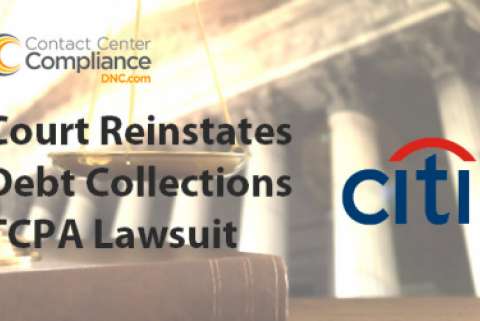Last week, the Ninth Circuit Court of Appeals reinstated a TCPA lawsuit previously dismissed for lack of Article III standing. In Elisa Romero v. Department Stores National Bank, the plaintiff claims she received nearly 300 calls from banks seeking payment for outstanding debt. The court’s decision to reinstate this lawsuit has important implications for defendants who challenge the TCPA at the pleading stage.
The TCPA lawsuit was filed in 2015 by Elisa Romero against Department Stores National Bank, a unit of Citigroup, claiming a violation of the Telephone Consumer Protection Act (TCPA). Ms. Romero alleged that the banks violated the TCPA and the Rosenthal Act when they called her cellphone using an Automatic Telephone Dialing System (ATDS). As a result, she claims to have received nearly 300 calls regarding a debt that Ms. Romero acknowledged she owed.
The TCPA and Rosenthal Act Explained
- The TCPA makes it unlawful for any person to (1) use an “automatic telephone dialing system” to call or text a cell phone number without the prior express consent of the called party; (2) call a cell phone or residential phone line using an artificial or prerecorded voice without the prior express consent of the called party; or (3) send an “unsolicited advertisement” to a fax machine in the absence of an established business relationship.
- The Rosenthal Fair Debt Collection Practices Act (Rosenthal Act) is the California version of the Federal Fair Debt Collection Practices Act, but it also applies regulations to the banks as well as the third party debt collectors. It prohibits debt collectors from engaging in certain practices while collecting consumer debts, such as, calling someone repeatedly with the intent to annoy the person called.
District Court's Ruling to Dismiss
Ms. Romero’s lawsuit is seeking compensation for calls made to her after July 2014 which is when she claims to have first asked the banks to stop calling. She has already admitted owing the debt that lead to the collections company calling her because she failed to make payments on her credit card. She also, didn’t dispute that she had provided the banks with her cellphone number.
Ms. Romero alleged injuries of “lost time, aggravation, and distress”.
The district court, Judge Cathy Ann Bencivengo, found that none of the calls caused a concrete injury and that Ms. Romero had no right to sue the banks. Essentially, the decision states that harm caused by phone calls must be attributable to the use of an ATDS to give rise to Article III standing. It also suggested that debt collection phone calls don’t necessary cause harm. It is important to note that the ruling on this lawsuit has since been used as a defense in several TCPA lawsuits.
The court also sided with the banks regarding the Rosenthal Act. In the courts opinion, the banks complied with the statutory safe harbor provision under the Act, which shielded the banks from liability when they promptly notified Ms. Romero that they had ceased placing calls on her account after having received her complaint.
In her ruling on a later lawsuit, Judge Cathy Ann Bencivengo expanded on her ruling when she suggested that it was impossible for debt collections calls to cause the type of harm Congress intended to prevent when enacting the TCPA because the TCPA was only designed to prevent telemarketing calls.
Ninth Circuit's Ruling to Reinstate
That brings us to February 28, 2018. The Ninth Circuit reversed the district court’s dismissal and remanded the case for further proceedings. In doing so, they rejected the premise that harm from calls needed to link back to the use of an ATDS.
“The TCPA is not limited to telemarketing calls; Congress recognized unsolicited contact as a concrete harm regardless of caller or content, and this harm is similar in kind to harm that has traditionally been redressable by courts.” -- Ninth Circuit Court of Appeal
The Ninth Circuit concluded that:
- Standing requires only that the harm be attributable to the Defendant’s conduct. The court citing its decision in Van Patten v. Vertical Fitness Group. In that case the consumer received over 290 calls, but only answered two. The appellate court concluded that the TCPA provided a cause of action for the autodialed debt collection calls that the consumer received after she asked the banks to stop calling. Such a violation of the TCPA was sufficient to establish standing (a legal right to sue) at the pleading stage.
- The banks were not entitled to the Rosenthal Act’s “Right to Cure” defense because they could not undo the harm to the consumer that their alleged violation had already caused. The appellate court explained that the banks could not reverse the stress, annoyance and aggravation that they had inflicted on the on Ms. Romero.
“Disputes regarding whether Romero gave prior express consent to receive calls from the Banks or revoked that consent go to the merits of her TCPA claim, not to her standing.”
-- Ninth Circuit Court of Appeal.
Conclusion
Based on the Ninth Circuit’s decision, future plaintiffs in TCPA lawsuits may only need to allege a regulation was violated to sue at the pleading stage. In California, it also appears that debt collectors can no longer used the Rosenthal Act as a shield from liability. Are the courts targeting debt collectors by removing any possible safe harbor?
Lost in the legal maneuvering is the issue of the debt owed by the consumer. Is it necessary for the courts to reward consumers who are themselves causing harm to the business that lent them money in good faith? The banks are not responsible for the non-payment of a debt owed. What we are watching now is a situation where debt collectors are caught between vague regulations, which are open to interpretation, and courts intent on punishing debt collectors for attempting to collect on money owned. It makes one wonder who’s the real victim.





